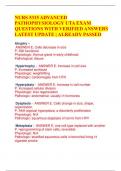Exam (elaborations)
NURS 5315 ADVANCED PATHOPHYSIOLOGY UTA EXAM QUESTIONS WITH VERIFIED ANSWERS LATEST UPDATE | ALREADY PASSED
- Course
- Institution
NURS 5315 ADVANCED PATHOPHYSIOLOGY UTA EXAM QUESTIONS WITH VERIFIED ANSWERS LATEST UPDATE | ALREADY PASSED Atrophy – ANSWER E. Cells decrease in size P. Still functional Physiologic: thymus gland in early childhood Pathological: disuse Hypertrophy - ANSWER E. Increase in cell size P....
[Show more]



